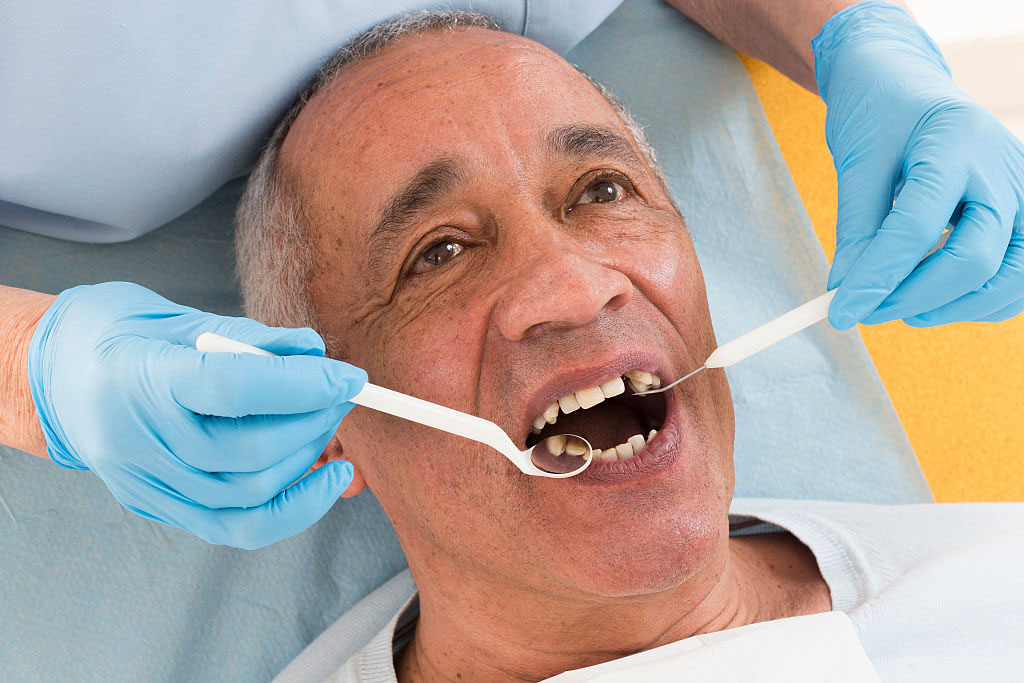How to Protect Your Teeth as You Age

You don’t have to lose your teeth; keeping them for a lifetime is possible.
Although it may become less important to you as you age, good dental health is essential.
One common misconception is that losing your teeth is inevitable. That’s just not true. With proper care your teeth can last a lifetime.
YOU MIGHT ALSO LIKE: Is Gum Disease Hereditary?
There’s also the misconception the cavities are a young person’s disease. Also not true. Cavities can be a problem at any age; they just may occur in different sites of the mouth.
The good news is that modern dentistry has taken a decided turn toward prevention, which means there are more ways than ever to protect your teeth as you age.
Very small cavities, for example, can be recalcified, meaning that minerals lost to the decay process can be restored to your teeth, stopping a cavity in its tracks.
“That said, the key to recalcification is early detection,” says Michael Apa, DDS. “Regular dental visits are crucial to early detection. Fillings, crowns, or any dental restoration should be replaced or heavily scrutinized every eight years. Some patients are of the ‘if it ain't broke, don't fix it’ era. But the reasoning behind this advice is to eliminate the spread of recurrent cavities that lurk under dental restorations.”
The longer you wait to replace dental restorations, the more problems you’ll have, Apa adds. “If the decay spreads undetected, it may eat up too much healthy tooth structure and need the support of a crown or reach the nerve and need a root canal,” he says.
Make sure you use an American Dental Association (ADA)-approved fluoride toothpaste. Fluoride works to prevent cavities in seniors as much as it does in children.
You might want to use an electric toothbrush; they’ve come a long way in a short time. Some seniors have less motor control than when they were younger. An electric brush can make up for that by doing more of the cleaning by itself. Again, make sure that the brush you buy is ADA-approved.
If you grind or clench during sleep, use a nightguard. Apa says tooth grinders can wear away a millimeter of tooth structure every year if the grinding goes undiagnosed. The nightguard is like a mouthguard used in athletics to protect their teeth.
The irony is that the longer you keep your teeth, the more problems can occur. Cavities on the soft root surface of teeth are more common as gums tend to recede with age.
YOU MIGHT ALSO LIKE: How to Keep Your Gums Healthy
Older people also tend to take more medications for a wide range of conditions. More than 400 drugs have been identified as causing dry mouth, which is a threat to dental health because it greatly reduces all-important saliva and it’s coating on the teeth.
To fix the problem, you can sip water all day. Some people find that stimulating salivary flow by chewing gum helps. Your dentist may also have you use a prescription or non-prescription saliva substitute if your dry mouth is bad enough.
A mouth without saliva is a mouth that will get cavities, no ifs, ands, or buts. Saliva is the true workhorse of the mouth, preventing diseases and maintaining a balance called homeostasis.
If your gums are red, swollen, and bleed easily, you have gingivitis, an early form of gum disease that can progress to a more dangerous problem called periodontitis . Once you have periodontitis, harmful bacteria have formed pockets under your gums and begin to dissolve the bone that holds your teeth in place. It’s the primary reason for tooth loss.
But it doesn't have to happen. The best way to combat periodontal (gum) disease is regular dental visits, where you receive cleanings and oral exams that can catch gum disease in it’s early stages and reverse it.
More than 43,000 Americans will be diagnosed with oral cancers this year, and more than 8,000 will die from it, according to The Oral Cancer Foundation. Its incidence definitely increases as you grow older, says Judith Ann Jones, DDS, a spokesman on elder care for the ADA.
Only about half of people who develop oral cancer survive the disease, Jones says. The best hope for survival is to discover it at its earliest stages — where there is an 80 percent chance of surviving for five years. That’s another reason for regular dental visits.
Another common problem for older adults that can lead to dental disease is tooth crowding. Teeth tend to shift over the years, making them harder to clean properly. Misaligned teeth can also erode tooth enamel and damage supporting tissue and bone.
If your teeth have shifted a lot, an orthodontist can fit you with a retainer or other devices that will stop and even reverse the tooth shifting.
Keeping your teeth for a lifetime is the norm today. The days of assumed tooth loss are long gone. But you need to maintain regular dental visits and practice good oral hygiene at home to protect your teeth as you age, just as you would when you were younger.
Updated:
April 07, 2020
Reviewed By:
Janet O’Dell, RN